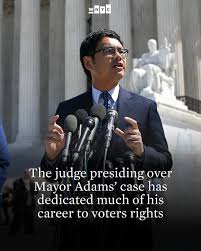Emil Bove, now his Acting Deputy AG, with Trump at
trial in a New York courtroom
Dale Ho, U.S. District Judge, will
hear the DOJ application to dismiss charges
against NYC Mayor Eric Adams
Eric Adams - the Mayor of New York - was indicted last September for bribery, wire fraud, soliciting contributions from a foreign national, and conspiracy to commit those offenses. According to the indictment he had for "nearly a decade", while serving as Brooklyn Borough President ,received luxury foreign travel paid by Turkish citizens. He concealed the unlawful source of campaign contributions, using that to obtain $10,000,000 in public campaign funds. Despite the gravity of this decade-long pattern of illegality, the Acting Deputy Attorney General of the United States Emil Bove has moved to dismiss the indictment.
There are, writes the former personal attorney of Donald Trump, now acting Deputy AG, "unique circumstances" warranting dismissal. Continuing the prosecution "would", Bove asserted in his Nolle Prosequi, "interfere with the defendant's ability to govern in New York City" thus posing "unacceptable threats to public safety, national security, and related federal immigration initiatives and policies."
Rule 48 Dismissal - Federal Rules of Criminal Procedure provides
(a) By the Government. The government may, with leave of court, dismiss an indictment, information, or complaint. The government may not dismiss the prosecution during trial without the defendant's consent.
The Acting Deputy Attorney General of the United States, Emil Bove, has filed a "nolle prosequi" seeking dismissal of - "without prejudice" - of Indictment 24 Cr. 556 [DEH] against New York Mayor Eric Adams. Danielle Sassoon, the acting U.S. Attorney for the Southern District of New York and five of the prosecutors of the Public Integrity Section of the Department of Justice refused to seek court permission to dismiss the indictment under Rule 48, above. Bove himself then opted to "direct, with leave of the Court" that "nolle prosequi without prejudice" be filed. The matter now rests with U.S. District Judge Dale E. Ho in New York.
Prosecutors have wide discretion as to whom to charge and as to the offenses to be charged. But once it has been placed on the docket, an indictment requires leave of court to dismiss.
Judge Ho will have to decide whether his authority is merely formal, or if he has substantive discretion. In that respect he will have to gage Bove's rationale that continuing the prosecution would jeopardize Adams's "ability to govern in New York City", which "poses unacceptable threats to public safety, national security, and related federal immigration initiatives and policies". Among those policies is Adams consent to allow federal marshals to enter the City's jail on Rikers Island to remove deportable aliens - those without visas and those who have "green cards" but who have committed or simply charged with minor offenses, provided by the Laken Riley .
But the State of New York is not defenseless. It has primary responsibility for maintaining the public safety, as does every state government. Principles of comity between sovereigns suggest that the judgments Bove has made are best left to the Governor of New York State, the Public Officers Law of which provides:
The chief executive officer of every city and the chief or commissioner of police, commissioner or director of public safety or other chief executive officer of the police force by whatever title he may be designated, of every city may be removed by the governor after giving to such officer a copy of the charges against him and an opportunity to be heard in his defense.
Neither Rule 48 nor the Public Officers Law provides clear guidance for Judge Ho. But it seems to me to be inherent that Judge Ho must determine the propriety of the request to dismiss. There is substantial reason to doubt that. Ms. Sassoon, a former law clerk of Antonin Scalia, stated in her passionate and rigorous letter to the Attorney General, explaining her offer to resign:
Given the highly generalized accusations of weaponization [by Mr. Bove] weighed against the strength of the evidence
against Adams, a court will likely question whether that basis is pretextual.
See, e.g., United States v . Greater Blouse, Skirt & Neckwear Contractors, 228 F.Supp.483, 487 (S.D.N.Y.1964) (
courts“ should be satisfied that he reasons advanced for the proposed dismissal
are substantial and the real grounds upon which the application is based")
Sassoon plainly finds the asserted grounds to be pretextual. Bove responded angrily.
Bove's "Nolle pros" would dismiss the charges against Adams "without prejudice", meaning that Adams would spend the balance of his term looking over his shoulder to Trump who could, at any time, change his mind and indict Adams if the Mayor did not provide the kind of supplication Trump seeks.
Hagen Scotten, another SDNY prosecutor, tendered his resignation, saying in a letter to A.G. Pam Bondi:
No system of ordered liberty can allow the Government to use the carrot of dismissing charges, or the stick of threatening to bring them again, to induce an elected official to support its policy objectives.
- GWC





